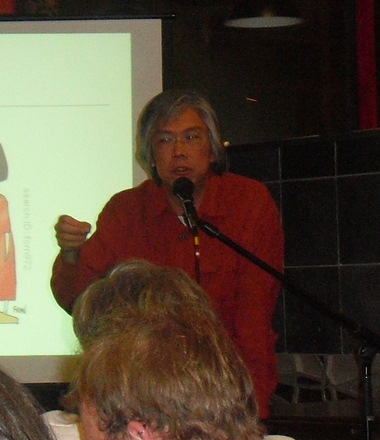How Safe Is Our Food And Water Supply?

UNBC's Dr. Laurie Chan (far left) speaks to crowd at Cafe Voltaire
Prince George, B.C. - It is a complex question that UNBC toxicologist, Dr. Laurie Chan, says has become even more challenging to answer over the past 10-years.
Dr. Chan says food safety issues have become global issues because of the way we eat and distribute food now. No longer is most of our food coming from our neighbourhood -- there's industrial-scale farming, big scale processing, and it's transported all over the country and, often, throughout the world.
Chan says, "At every single step, there are possibilities of contamination." And the wide-scale distribution means when there is contamination, a large number of people can be affected. He points to the listeria contamination of some Maple Leaf products in 2008 that resulted in the deaths of 23 people across Canada.
According to the World Health Organization, 1.8-million people died from diarrhoeal diseases - mostly from contaminated food and water - in 2005. Chan says that's mainly in developing countries, but he points out there are 76-million cases of foodborne illnesses in the U.S. every year, resulting in 325-thousand hospitalizations and 5500 deaths. Canada's figures are about one-tenth of those numbers...meaning there are roughly 550 such deaths annually.
"It creates a lot of social and economic burden, when people get sick they can't go to work." Dr. Chan says there are huge losses in productivity and huge hospital costs.
The Canadian Food Inspection Agency is responsible for randomly checking our food products for chemicals and bacteria, but Chan says the organization simply doesn't have the money or the manpower to check everything. In addition, the toxicologist says, the number of chemicals in use is far outpacing scientific analysis. Chan says there are between 60- and 70-thousand chemicals produced and used commercially, worldwide. Of those, there is only toxicity information available for about 14-thousand, and only 5500 have been analyzed to determine whether they cause cancer. Add to this, that between 700 and one-thousand new chemicals are coming to market every year and Chan says simply, "The problem is the workload is much higher than toxicologists can handle."
He points to new legislation passed by the European Union as a beacon of hope because it puts the burden of proof back onto industry - companies cannot produce something until it's proven to be safe. "This EU system is very exciting because most of the chemicals that are sold in Europe are probably sold in Canada or other parts of the world, as well, so we are hoping if this works, then it will be a global improvement."
 That is the complex system surrounding food safety. Water safety, says Chan, is a little less so because it is more localized - the burden falls to municipalities to ensure safety. First of all, he says, Prince George water comes from underground aquifers and is excellent. "This is like the most pristine water that you can get, so it's foolish to drink bottled water coming from Toronto...and the bottle is kept on the shelf for two months before you even drink it."
That is the complex system surrounding food safety. Water safety, says Chan, is a little less so because it is more localized - the burden falls to municipalities to ensure safety. First of all, he says, Prince George water comes from underground aquifers and is excellent. "This is like the most pristine water that you can get, so it's foolish to drink bottled water coming from Toronto...and the bottle is kept on the shelf for two months before you even drink it."
On top of that, Chan says the City has a well-maintained and monitored treatment facility for chlorination that prevents any bacteria growth enroute to your tap.
But the UNBC professor says the same cannot be said for smaller rural communities, particularly First Nations communities, across the country, "Because a lot of times they do not have the infrastructure, in terms of treatment facilities, to treat the water or the trained personnel to monitor how much chlorine to put in, ecetera." He says this has been an ongoing issue and the scientific community has been pushing the federal government to do a better job.
On the whole, Chan feels our food and water supply are safe, but not bullet-proof. "Do I worry about food and water a lot? No. Do I care about it? Yes."
Previous Story - Next Story
Return to Home










Vancouver, Kamloops, Kelowna, etc don't do it anymore, some have never added this chemical.
It's already in toothpaste. Let's have another look at this practice in light of revelations and cautions about the long term effects of fluoride on teeth and all organs in the human body.
More and more dentists are beginning to have second thoughts in view of the latest evidence.
Can't we leave it up to individuals whether they want that in their bodies rather than mass medicating the whole population?